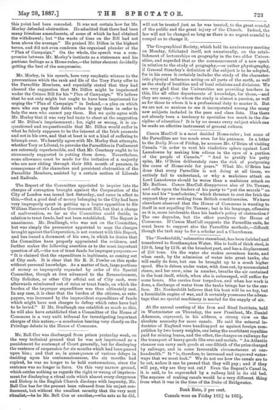The Report of the Committee appointed to inquire into the
charges of corruption brought against the Corporation of the City of London was issued last Saturday, and came in effect to this,—that a good deal of money belonging to the City had been very improperly spent in getting up a bogus opposition to Sir William Harcourt's London Government Bill, but that a charge of malvereation, so far as the Committee could decide, in relation to trust funds, had not been established. The Report is unanimous. Mr. Bradlaugh, who was not on the Committee, but was simply the prosecutor appointed to urge the charges brought against the Corporation, is not content with this Report, and has issued a document of his own, in which he denies that the Committee have properly appreciated the evidence, and further makes the following assertion as to the most important question of all,—the use of trust fends for improper purposes:— "It is claimed that the expenditure is legitimate, as coming out of City cash. It is clear that Sir R. N. Fowler on this spoke without personal knowledge. As a matter of fact, large portions of money so improperly expended by order of the Special Committee, though at first advanced to the Remembrancer, City Solicitor, or other City official out of City cash, were afterwards reimbursed out of rates or trust funds, on which the burden of the improper expenditure was thus ultimately cast. In any case, it is clear that the burden of the citizens, as rate- payers, was increased by the improvident expenditure of funds which might have met charges to defray which rates have had to be levied." If Mr. Bradlaugh can establish as much as this, he will also have established that a Committee of the House of Commons is a very unfit tribunal for -investigating important charges of this nature,—a conclusion bearing very clearly on the Privilege debate in the House of Commons.


































 Previous page
Previous page